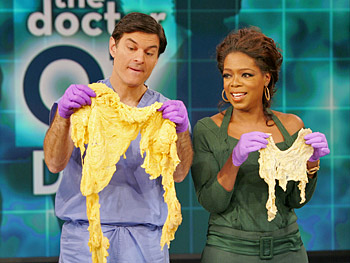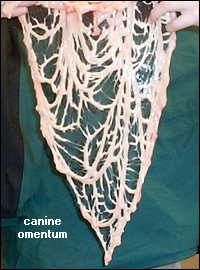 In one of my first posts I wrote in March 2007 I shared how the book “You On A Diet” gave me some much needed motivation at the end of 2006. I was looking for motivation to get back on track because I had not been eating the healthiest of food, nor had I been keeping up with my exercise routine.
In one of my first posts I wrote in March 2007 I shared how the book “You On A Diet” gave me some much needed motivation at the end of 2006. I was looking for motivation to get back on track because I had not been eating the healthiest of food, nor had I been keeping up with my exercise routine.
When I came across “You On A Diet“ I was struck by the imaginative, creative illustrations by Gary Hallgren (who I’ve since learned is a cartoonist), along with the other excellent, easy to understand content of the book (i.e.: how your digestion works, how hormones that affect your appetite can be turned on or off, how what you eat determines how much you eat, how to avoid internal inflammation, and much more).
One of the topics really grabbed my attention was regarding the omentum.
Even though everyone has one, I hadn’t heard of this organ before. We didn’t learn about it in school, and I hadn’t heard it discussed anywhere else. We are always hearing about the heart, liver, kidneys, lungs, stomach, and brain, but how often do you hear talk about your omentum?
What is an Omentum and What does it Look Like?
So what exactly is an omentum? Your omentum is:
When I read this, it truly motivated me to get moving. I couldn’t stand the thought of having some fatty organ inside my abdominal cavity just laying around and causing all kinds of havoc.
I kept reading and learned that the omentum is the best indicator of how you deal with chronic stress. If you are under constant stress, your body “releases high amounts of steroids into your bloodstream in the form of the hormone cortisol”. Your body has to deal with these excess hormones, and this is your omentum’s job. Your omentum takes these hormones from your bloodstream, and the hormones in turn step up the ability of your omentum to store fat.
This results in a fat belly for you, which is the easiest indicator of how much chronic stress you are under in your life. The problem (besides your dismay over your looks) is that the fat stored in your omentum is the first source of fuel that your internal organs use, especially your liver. All of those added hormones throw off your metabolism by making your omentum resistant to insulin, which means that sugar is floating around in your bloodstream instead of being used as normal by your cells. The results are:
- Tissue damage from chronically raised blood sugar.
- Your hormone balance is upset due to your omentum taking in an abundance of inflammatory chemicals.
- More inflammatory chemicals are sent marauding around your system because your omentum is sending “high-octane” fat as a form of fuel directly to your liver, which in turn sends out the chemicals.
- Your omentum creates inflammation throughout your system (a serious health risk) by giving your internal organs fuel. Remember, the fat in your omentum is the first source of fuel for all internal organs, not only the liver.
- Your omentum causes (bad) cholesterol and triglyceride levels to rise by fueling your liver with its fat.
So, you get the point that having a fat-clogged omentum in your abdominal cavity isn’t the best thing for your health, or your looks. Since the only way to measure the size of your omentum is with a CT scan, how can you easily tell if your omentum is overweight? If you have a (hard) beer belly, or an apple shaped body, your omentum is likely storing fat.
You can also measure your waist: if you are a woman and you measure over 35 inches, or a man over 40 inches, then your omentum is taking up space. These measurements put you at major risk for a heart attack since your omentum is now approximately 5 inches thick (). It is in there, creating an inflammatory process that will irritate your arteries and possibly block them.
Now, the fun part: what does an omentum look like? Personally, I really enjoy the illustrations in “You On A Diet”. They are fun and make the process of learning about your body more light-hearted, even though it’s a serious topic. Since you would need to have the book in front of you to see what I’m talking about though, I’ve also searched for some images for you online.
A healthy omentum looks rather like sheer nylons. Below is an image of a healthy, canine’s omentum:
This organ is draped off of your stomach, however if it is clogged with fat, it wouldn’t really be draped languidly, but rather clumped and bunched up.
The most impressive photo is from an Oprah episode when Dr. Oz brought both a fatty and a healthy omentum with him. You can see the difference between the fatty omentum (Dr. Oz is holding) and a healthy omentum (Oprah is holding):
You can also go to Oprah’s site to see a slide show of other photos from Dr. Oz’s appearance when he presented his book “You On A Diet”. Additionally, Dr. Oz appeared a second time and you could check out that video for more about the omentum here.
If you would like to learn more than you ever imagined about how the omentum is being used in various surgeries in India, read this article from the Indian Journal of Surgery.
When it comes down to weight loss, you can take encouragement from the fact that once you start losing fat you will be making a difference in the size of your omentum and the effect that it has on your body. Your body’s blood pressure, sugar, and cholesterol will start regaining healthy levels as soon as you start losing fat; this can occur even before you see any outward physical signs of weight loss.
I recommend picking up a copy of “You On A Diet” by Dr. Michael F. Roizen and Dr. Mehmet C. Oz. There is so much useful information in this book, and as I mentioned, it is written in a manner that makes learning about your body fun. I find it highly motivating. If you are interested, you can find it here on Amazon:

If instead of reading another book you’d rather end your food and weight struggles at the root (so that you won’t have to worry about body fat anymore) then click here for your first step. Complete your application now for a complimentary one-on-one weight loss discovery session. It’s your first step towards breaking free of the struggle! Click here to get started now.
Related articles:






If you have a tummy tuck or lipo will it hurt the omentum?
Hi Gerilynn,
Thank you for your question, it’s a good one! I’m actually putting a full post together that I will publish today to answer this. Thank you for inspiring my post! 🙂
All the best,
JoLynn
Yuck. I have found that after a few years of intense stress that my hormones and weight were a mess. The doctors have me on a program but never did they mention this! Thanks for the info and, eeewwwwhhhh!
Hi GG,
That’s great that you’re on a healthy program now. Stress can do so much harm to the body, and most people in the US are suffering under a great deal of it. Maybe knowing about your omentum will give you motivation to stick to your healthy lifestyle…that’s the effect it had on me. 🙂
I have read the article on the Omentum with great interest and like your other readers I too was never told about this fatty organ, I have had a so-called hard beer belly ever since I was a child as I was always called ” little fryer tuck “.
I don’t drink or smoke and my cholesterol and blood pressure are both good, now although mine has not got any bigger over time I can only think that it’s been caused through stress, but can this be so even from childhood with me coming from a broken family home.
In looking at the pictures at normal and over-sized Omentum, what I would like to know is this, as recommended, upon following a healthy diet and exercise regime, will my oversized Omentum shrink back to the size of a healthy one or will it be like a deflated balloon.
Thank you
Hi Phil,
You asked an excellent question! Now I’m not a doctor, but when you lose fat you lose that fat all over your body, which includes your omentum. The picture of Dr. Oz holding the enlarged, fatty omentum has a bunch of fat globules on it, but through weight loss, that stuff (fat) will also be “lost” through weight loss.
It’s really important to lose fat from the omentum because it has a direct line to your organs and can be toxic. Just like any weight loss though, you can’t spot reduce your fat loss, but be assured that a healthy weight loss and exercise plan will help you shrink your omentum and lose that fat.
So, long story short, it should go back to a normal size for your body. There’s also a bunch of info about the omentum in the book YOU On A Diet if you want to check it out – I love that book.
Hope that helps, let me know if you have any other questions! 🙂
I’ve read You On A Diet, and I agreee, it’s a great book. I had never heard of the Omentum before either. What I’ve been wondering is, what is the health purpose of this organ and what would be the side effects of having it removed or partially removed if it’s enlarged?
Hi,
i wouldnt say im a very un healthy person or overwieght, but lately, ive been under a lot of stress in school. i have never seen anyone else with it, especially my age, before. ive had this omentum (before i found out the name my friends and i called it a random flab) for almost a year, and i’m wondering how to get rid of it! Help me!
Thanks!
emmm’s last blog post..He Predicts Pennsylvania
Hi Amy,
Removing your omentum should not even be a consideration – it’s a vital organ and the problem is that when you are overweight it also gains weight and toxins – the solution is to change to a healthy lifestyle filled with whole foods, fresh fruits and veggies, lean proteins, complex carbs, clean water, and regular exercise.
When an overweight person loses weight in a healthy manner the omentum will naturally “lose weight” also, it should never be removed. (there’s more info about it in YOU On A Diet, it’s quite interesting). 🙂
Hi Emmm,
Chronic stress puts the body under constant “pressure” and can lead to all sorts of health problems. The best thing I can recommend is making changes in your lifestyle now to reduce your stress, whether that’s changing your schedule, your class load, your friends, adding in daily meditation and connecting with your inner spirit.
I don’t know how you eat and exercise either, but I’d suggest the same thing I did to Amy in my comment above….and include lots (I drink at least 100oz) of clean water daily.
I hope this helps – you see, overweight is about a lot more than just diet & exercise, but that omental fat is the kind that you do need to be concerned about because it’s so close to your organs. Again though, changing to a healthy lifestyle will take care of it. 😉
As an RN, I have never heard of the diagnosis “Cancer of the Omentum”. What can you tell me about this disease, including testing for this
diagnosis and the prognosis. Could you recommend any reading material on this topic? Thanks, Virginia
Hi Virginia,
I’m not familiar with cancer of the omentum either, but I suppose that it’s possible since cancer can grow anywhere….I’ve also heard that cancer likes fat, and so it makes sense that a fatty omentum could be a breeding ground for cancer cells.
Actually, YOU On A Diet addresses the connection between fat and cancer, and that fact that omental fat contributes to inflammation in the body, and cancer likes inflammation. The book doesn’t give a test for this but I would recommend picking up a copy to learn more about it.
Another book I highly recommend that does not address the omentum but does address cancer is How To Prevent Breast Cancer (read about it in my post). It’s about keeping your lymph system clean and clear, which will correlate with the message in YOU On A Diet – cutting out the inflammation in the body.
Cancer of (or in) the omentum can be ovarian cancer. I was diagnosed with stage 3A ovarian cancer in January 2002, and had surgery to remove the ovaries. At the time of surgery, a biopsy was performed on my omentum. Because the biopsy results were not definitive, that is, they couldn’t decide whether the cells were cancerous, my physician removed my omentum. I had never heard of this organ before until mine was removed. Because of this site, I now know what it looks like.
P.S. Please help raise public awareness of ovarian cancer by posting this comment. It’s a shame that women have to learn about the omentum after they’re diagnosed with OVCA. Thanks.
Hi Tina,
Wow, thank you for sharing this, I’m glad that you came through it all ok.
You know the first I’d ever heard of the omentum was after reading YOU On A Diet and I had never heard of a story like your’s until now. Take care of yourself! 🙂
This has been so helpful! I was a skinny 5’6″ – 120lbs at age 55 until I lost my job 2 yrs ago. After awhile I started feeling and seeing a hard tummy bulge above my naval. I kept saying it looked like a beer belly, but I don’t drink beer. It felt hard when I tried to sleep on my stomach. I went to the dr. he said you’re just getting old and fat. I’ve never been fat. I’m going to buy Dr. Oz’s book today , this is so accurate, but because I’m not an overeater, I knew it had to be something else…Stress you bet. Thanks
Hi Anne,
Good, I’m glad I could help!
And on the topic of stress, in YOU On A Diet Dr. Oz does go into that….stress is one of the worst things for the body in general, and it doesn’t help your weight, that’s for sure. Enjoy the book!
I’ve heard of drugs like Relacore, Anopril, Therastress, etc., are supposed to address the “stress induced” (cortisol) fat that is stored in the omentum.
Do you have any insight into how these work or even if they work as touted? Their ads all sound so convincing. If they do work, I can’t imagine they’d be safe to use, too? I’d be interested to learn of any experiences you’ve heard of in this regard, too.
Would someone who has “love handles” that go all the way around to the back be excess omentum fat, too?
Hi Carla,
I haven’t used any of those drugs before but I’ve seen a commercial for one of them. The thing is that they are supposed to block the hormone (cortisol) that is released in the body due to chronic stress.
Do they work? I don’t know, but I can tell you what does work, something that I’m working on myself right now – reducing that chronic stress and anxiety in your life.
I don’t promote any band-aid solutions that don’t solve the cause of the problem and that’s what these drugs are – they aren’t going to help you solve why you have all of that cortisol in your body!
You’ll never be able to get rid of all stress and you wouldn’t want to but that chronic stress, living in that zone is deadly for the body, not to mention the abdominal weight gain it causes. If you want to you can follow along with my 15-week series, an experiment I’m doing on myself to reduce stress and anxiety in my life.
I hope my feedback helps and I support you in solving the cause of the problem. 🙂
I had my omentum removed when I had uterine cancer and I am still heavy in the belly.
not sure how that affects me, not having it that is.
I am having a hysterectomy in a couple of weeks. My doctor is said she is removing omentum. Do I have any health problems to look forward to in the future??
Hi Amelia,
Well, I’m not completely sure how not having an omentum would affect your health because it is a vital organ and it helps you when you have those excess hormones in your system due to stress – the question I would ask your doctor is if cancer was found in it? Is that why they removed it? And if no cancer was found in your omentum, why was it removed?
I’d be very interested to know the answers to these questions if you’d like to leave another comment.
And as far as being heavy in the belly, if you don’t have an omentum then that would be belly fat and you cannot “spot reduce” the body. You can however, change your lifestyle and get fit and healthy, which will help you shed fat all over your body.
Hi Heather,
Like Amelia who commented before you, I’d be very interested to know what you find out when you ask your doctor why she is removing your omentum. I’m not a doctor and I’m curious what the reason would be that they would remove it.
And as far as the future I would suggest that if you have chronic stress in your life that you take action to change your lifestyle to deal with that.
You cannot remove all stress but if you are constantly feeling stressed out then I don’t know how the body would react without the omentum. One of its jobs is to “take care” of those excess hormones that are produced when you’re constantly under stress.
oh my GOD THIS SO BAD TO THINK I HAVE BEEN LIKE THIS FOR A FEW YEARS. what about candida’s is that fixable.